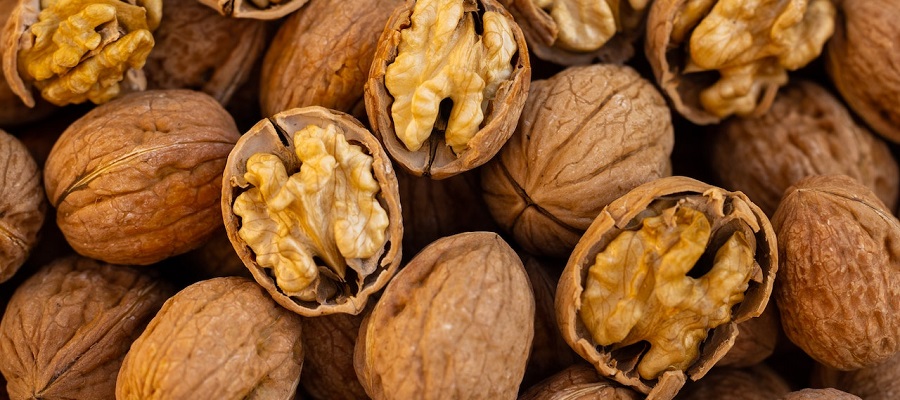Nuts are a type of fruit that consists of a hard shell and a seed, which is generally edible. They are a good source of nutrients and are often considered to be a healthy snack. There are many different types of nuts, including almonds, cashews, walnuts, pecans, pistachios, and hazelnuts, among others. Each type of nut has its own unique flavor and texture, as well as its own specific set of nutrients. Nuts are a good source of healthy fats, protein, fiber, and various vitamins and minerals. They can be eaten on their own or used in a variety of dishes and baked goods. Some people have allergies to nuts, so it's important to be aware of this if you are planning to incorporate nuts into your diet.
Are nuts a good source of nutrients?
Yes, nuts are a good source of nutrients. They are high in healthy fats, protein, and fiber, as well as various vitamins and minerals. The specific nutrients found in nuts can vary depending on the type of nut. For example, almonds are a good source of vitamin E, calcium, and magnesium, while walnuts are a good source of omega-3 fatty acids. In general, nuts are a nutritious and healthy snack option. They can be a good source of energy and may help to improve heart health, as well as aid in weight management when consumed in moderation as part of a healthy diet.
What are some common types of nuts?
There are many different types of nuts, including:
- Almonds
- Cashews
- Walnuts
- Pecans
- Pistachios
- Hazelnuts
- Macadamia nuts
- Brazil nuts
- Peanuts (technically a legume, but often referred to as a nut)
- Chestnuts (also technically a fruit, but often referred to as a nut)
These are some of the most common types of nuts, but there are many others as well. Each type of nut has its own unique flavor and texture, as well as its own specific set of nutrients.
What nutrients can you find in nuts?
Nuts are a good source of a variety of nutrients, including:
-
Healthy fats: Nuts are a good source of healthy fats, including monounsaturated and polyunsaturated fats. These types of fats can help to improve heart health and lower cholesterol levels.
-
Protein: Nuts are a good source of protein, which is important for building and repairing tissues in the body. They can also help to keep you feeling full and satisfied.
-
Fiber: Nuts are a good source of fiber, which is important for maintaining regular bowel movements and supporting gut health.
-
Vitamins and minerals: Nuts are a good source of various vitamins and minerals, including vitamin E, calcium, magnesium, and potassium. The specific nutrients found in nuts can vary depending on the type of nut.
-
Antioxidants: Some types of nuts, such as walnuts and pecans, are high in antioxidants, which are substances that can help to protect the body's cells from damage caused by free radicals.
Overall, nuts are a nutritious and healthy snack option that can provide a range of benefits when consumed as part of a balanced diet.
Can nuts be eaten on their own or are they only used in dishes?
Nuts can be eaten on their own as a snack, or they can be used in a variety of dishes and baked goods. Nuts can be enjoyed raw, roasted, or salted, and they can also be ground into a paste or used to make nut butter. Some common ways to incorporate nuts into your diet include:
- Snacking on a small handful of nuts as a healthy snack
- Adding nuts to salads, cereals, or yogurt
- Using nuts in baked goods, such as cookies, cakes, or breads
- Sprinkling nuts over oatmeal or other hot cereals
- Using nut butter as a spread on toast or as a dip for fruit
- Adding nuts to savory dishes, such as stir-fries or grain bowls
Nuts can be a versatile ingredient that can add flavor, texture, and nutrition to many different types of dishes.
What is the texture of nuts like?
The texture of nuts can vary depending on the type of nut and how it is prepared. In general, nuts have a crunchy texture due to their hard outer shell. Some nuts, such as almonds and cashews, have a smoother texture, while others, like walnuts and pecans, have a more uneven and craggy texture. Nuts can also have a slightly chewy texture, depending on how they are prepared. For example, raw nuts may have a firmer texture, while roasted nuts may be slightly softer and more tender. The texture of nuts can also be affected by how they are processed. For example, nuts that have been ground into a paste will have a smoother, creamier texture, while nuts that have been made into nut butter will have a spreadable consistency.
What is the flavor of nuts like?
The flavor of nuts can vary depending on the type of nut. In general, nuts have a slightly nutty and earthy flavor, with some variations in intensity and depth. Some common flavor characteristics of different types of nuts include:
-
Almonds: Almonds have a sweet and nutty flavor, with a slightly crunchy texture.
-
Cashews: Cashews have a creamy, slightly sweet flavor and a smooth texture.
-
Walnuts: Walnuts have a slightly bitter, earthy flavor and a crunchy texture.
-
Pecans: Pecans have a sweet, buttery flavor and a crunchy texture.
-
Pistachios: Pistachios have a slightly sweet and nutty flavor and a crunchy texture.
-
Hazelnuts: Hazelnuts have a rich, earthy flavor and a slightly crunchy texture.
Overall, the flavor of nuts can vary depending on the type of nut and how it is prepared. Some nuts may be roasted or seasoned, which can affect their flavor. Nuts can also be used in a variety of dishes to add flavor and texture.
Can nuts be cooked or baked?
Yes, nuts can be cooked or baked. Nuts can be enjoyed raw, but they can also be prepared in various ways to bring out their flavor and texture. Some common ways to cook or bake with nuts include:
-
Roasting: Nuts can be roasted in the oven or on the stovetop to bring out their flavor and make them crunchier. To roast nuts in the oven, preheat the oven to 350°F (180°C) and spread the nuts in a single layer on a baking sheet. Roast the nuts for 8-12 minutes, or until they are fragrant and golden brown. To roast nuts on the stovetop, heat a dry skillet over medium heat and add the nuts. Stir the nuts frequently until they are fragrant and golden brown.
-
Toasting: Nuts can also be toasted in a dry skillet over medium heat until they are fragrant and lightly browned. This is a quick and easy way to bring out the flavor of nuts.
-
Baking: Nuts can be used in a variety of baked goods, such as cookies, cakes, breads, and pastries. They can be used whole, chopped, or ground into a meal or flour.
Overall, nuts are a versatile ingredient that can be used in a variety of dishes and baked goods. They can add flavor, texture, and nutrition to many different types of recipes.
Are nuts good for people with allergies?
Some people may have allergies to nuts, so it's important to be aware of this if you are planning to incorporate nuts into your diet. Nut allergies are one of the most common types of food allergies and can range from mild to severe. Symptoms of a nut allergy can include itching or tingling in the mouth, hives, swelling of the face, lips, tongue, or throat, difficulty breathing, nausea, vomiting, and diarrhea. In severe cases, a nut allergy can cause a life-threatening reaction known as anaphylaxis. If you have a nut allergy, it is important to avoid nuts and products that contain nuts, and to carry an epinephrine injector (EpiPen) with you at all times in case of a severe allergic reaction. If you are not sure if you have a nut allergy, it is important to speak with a healthcare provider. They can perform allergy testing to determine if you are allergic to nuts and provide guidance on how to manage your allergy.
Can nuts be stored for a long time?
Nuts can be stored for a long time if they are stored properly. Proper storage can help to extend the shelf life of nuts and keep them fresh. Here are some tips for storing nuts:
-
Store nuts in an airtight container: To keep nuts fresh, it is important to store them in an airtight container, such as a jar with a tight-fitting lid or a resealable plastic bag. This will help to keep out moisture and prevent the nuts from becoming rancid.
-
Keep nuts in a cool, dry place: Nuts should be stored in a cool, dry place, such as a pantry or cupboard. Avoid storing nuts in damp or humid areas, as this can cause them to spoil more quickly.
-
Refrigerate or freeze nuts for longer storage: To extend the shelf life of nuts, you can store them in the refrigerator or freezer. Nuts can be stored in the refrigerator for up to several months, or in the freezer for up to a year. To freeze nuts, place them in an airtight container or plastic bag and seal it tightly.
Overall, proper storage can help to extend the shelf life of nuts and keep them fresh. It is important to store nuts in an airtight container, in a cool, dry place, and to refrigerate or freeze them for longer storage if needed.
How should nuts be stored to maintain their freshness?
To maintain the freshness of nuts, it is important to store them in an airtight container, in a cool, dry place, and to refrigerate or freeze them for longer storage if needed. Here are some more specific tips for storing nuts to maintain their freshness:
-
Store nuts in an airtight container: To keep nuts fresh, it is important to store them in an airtight container, such as a jar with a tight-fitting lid or a resealable plastic bag. This will help to keep out moisture and prevent the nuts from becoming rancid.
-
Keep nuts in a cool, dry place: Nuts should be stored in a cool, dry place, such as a pantry or cupboard. Avoid storing nuts in damp or humid areas, as this can cause them to spoil more quickly.
-
Store whole nuts in the shell: Nuts that are still in the shell can stay fresher for longer, as the shell helps to protect the nut inside. If you are not planning to use the nuts right away, it is a good idea to store them in the shell until you are ready to use them.
-
Avoid exposing nuts to light and heat: Nuts can become rancid more quickly if they are exposed to light or heat, so it is important to store them in a cool, dark place. Avoid storing nuts in direct sunlight or near a heat source, such as a stove or oven.
Overall, proper storage can help to maintain the freshness of nuts and extend their shelf life.
Can nuts be ground into a paste?
Yes, nuts can be ground into a paste. Nuts can be ground into a paste using a food processor or a high-powered blender. To make a nut paste, you will need to start with raw or roasted nuts, depending on your preference. You can also add a small amount of oil, such as coconut oil or olive oil, to help the nuts grind more easily and give the paste a smoother consistency. To make a nut paste, follow these steps:
- Place the nuts in a food processor or high-powered blender.
- Process the nuts until they are finely ground. This may take several minutes, depending on the power of your appliance.
- If the nuts are not grinding easily, you can add a small amount of oil, a tablespoon at a time, to help them grind more easily.
- Once the nuts are ground into a paste, you can use it immediately or store it in an airtight container in the refrigerator for later use.
Nut paste can be used in a variety of dishes, such as sauces, dips, and spreads. It can also be used as a base for homemade nut butter. Nut paste can be a good source of healthy fats, protein, and other nutrients, and it can add flavor and texture to many different types of dishes.
What dishes can nuts be used in?
Nuts can be used in a variety of dishes to add flavor, texture, and nutrition. Some common dishes that feature nuts include:
-
Nut butter: Nut butter, such as peanut butter or almond butter, is made by grinding nuts into a paste and can be used as a spread on toast, as a dip for fruit, or in baked goods.
-
Salad: Nuts can be added to salads as a crunchy topping or mixed into the salad greens. They can be used whole, chopped, or ground into a meal.
-
Granola: Nuts can be used in homemade granola to add flavor, texture, and nutrition. They can be used whole or chopped and mixed with oats, dried fruit, and sweeteners.
-
Baked goods: Nuts can be used in a variety of baked goods, such as cookies, cakes, breads, and pastries. They can be used whole, chopped, or ground into a meal or flour.
-
Snacks: Nuts can be enjoyed on their own as a snack, or they can be used in homemade trail mix or energy bars.
-
Savory dishes: Nuts can also be used in savory dishes, such as stir-fries, grain bowls, and sauces. They can add flavor and texture to many different types of savory dishes.
Overall, nuts are a versatile ingredient that can be used in a variety of dishes to add flavor, texture, and nutrition.
Can nuts be used as a substitute for other ingredients in recipes?
Nuts can be used as a substitute for other ingredients in some recipes, depending on the recipe and the desired outcome. Here are a few ways that nuts can be used as a substitute in recipes:
-
Nut butter: Nut butter, such as peanut butter or almond butter, can be used as a substitute for butter or oil in some baked goods. It can add moisture and flavor to cakes, cookies, and other baked goods.
-
Nut meal: Nuts can be ground into a meal and used as a substitute for flour in some recipes. Nut meal can add nutrition and flavor to baked goods, and it can be used in place of all or part of the flour in a recipe.
-
Nut milk: Nuts can be soaked and blended with water to make nut milk, which can be used as a substitute for dairy milk in some recipes. Nut milk can add a creamy texture and nutty flavor to smoothies, soups, and other dishes.
Overall, nuts can be a useful substitute for other ingredients in some recipes, depending on the recipe and the desired outcome. It is important to keep in mind that using nuts as a substitute may alter the flavor and texture of the final product, so it may be necessary to adjust the recipe as needed.
Are there any health benefits to eating nuts?
Yes, there are many potential health benefits to eating nuts. Nuts are a good source of healthy fats, protein, fiber, and various vitamins and minerals, and they can be a nutritious and healthy snack option. Some potential health benefits of eating nuts include:
-
Heart health: Some studies have shown that regularly consuming nuts, particularly those that are high in unsaturated fats, such as almonds and walnuts, may help to improve heart health by lowering cholesterol levels and reducing the risk of heart disease.
-
Weight management: Nuts are a high-energy food, but they are also high in fiber and protein, which can help to keep you feeling full and satisfied. This can make them a helpful snack option for weight management.
-
Diabetes management: Some studies have suggested that regularly consuming nuts may help to improve blood sugar control and reduce the risk of type 2 diabetes.
-
Cognitive function: Nuts are a good source of various nutrients that are important for brain health, such as healthy fats, vitamin E, and antioxidants. Some studies have suggested that regularly consuming nuts may have a protective effect on cognitive function and may help to reduce the risk of cognitive decline.
Overall, there are many potential health benefits to eating nuts, and they can be a nutritious and healthy snack option when consumed as part of a balanced diet.


